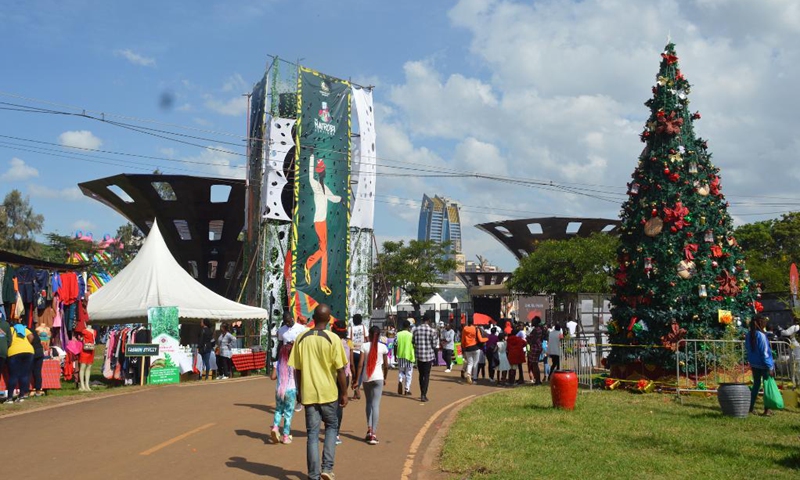
This photo shows a view at the inaugural Nairobi festival in Nairobi, Kenya, Dec. 17, 2022. (Photo by Charles Onyango/Xinhua)
With carefully measured words of persuasion, Gideon Ray encourages a customer visiting his second-hand shoe shop domiciled in one of the bustling streets in downtown Nairobi, the Kenyan capital, to purchase a pair of shoes.
After a fleeting haggle, the customer resolves to buy a pair, much to Ray's delight.
With the festivities beckoning, Kenyans are flocking to shopping malls, beauty shops, and bus and train stations ahead of the Christmas festivities.
Closer scrutiny of the trappings of the traditionally revered holiday season, however, reveals not all is merry. Ray said during a recent interview that although footfalls are steady, purchasing power has decreased drastically.
"The people coming into the shop might seem many but out of twenty visits, I am only selling to about five people in a day," said Ray. "I sell label (sneaker brands) shoes and in 2019 around Christmas people used to buy them for 5000-6000 shillings (40.57-48.69 U.S. dollars) but now most of the shoes have come down to just 20.29 dollars yet they remain unaffordable for most people."

A trader displays second-hand shoes for sale in Nakuru County, Kenya, on Sept. 1, 2022. (Photo by Sheikh Maina/Xinhua)
Ray admitted that if he lowers the prices of his shoes further, he will be embarking on a path of loss-making, adding that his customers are lamenting over the high cost of essential commodities against stagnant, squeezed incomes.
A recent industry report noted that Kenyans will be spending 17 percent less on Christmas celebrations than they did in 2021. The average spending is also expected to be 1.65 times the country's average income, highlighting the high costs associated with celebrations.
The study by world remit was determined after accessing the cost of food, and decor to average citizens' incomes.
In the recent past, Kenyans have continued to bear the brunt of the high cost of food, fuel, and cooking oil. This phenomenon has been pushing the country's monthly inflation digits higher and higher.
In October, the annual inflation rate stood at 9.6 percent, the highest one experienced since 2017.
Other critical drivers poised to inflict financial distress include the conflict between Ukraine and Russia, which interrupted wheat and fertilizer imports.
Additionally, a prolonged severe drought affecting more than 20 counties continues to raid the country's food basket.

Matatu operators load goods and items of passengers traveling to upcountry areas for the festive season in Nairobi, Kenya, Dec. 20, 2022. (Photo by Fred Mutune/Xinhua)
Nicholas Kamau threads around one of the busiest bus terminus in downtown Nairobi, pushing a load of goods with the owners stumbling behind him, trying to keep up with the speed.
"Christmas is for the rich. The rest of us have to work during the holidays. I cannot afford the bus fare of 24.37 U.S. dollars being charged to go to my hometown in north-western Kenya and still buy food to make everyone happy," said Kamau.
Kamau confessed in between heaves and sighs how burdensome life has become for the low-income earner.
Traditionally during the festivities, Kamau would have been in his ancestral home accompanied by his family but he finds himself working with no prospect of traveling.
"My children will understand because if we forego Christmas they can get new school uniforms next year," said Kamau.
It is a long-standing practice for Kenyans to vacate cities and towns during the festivities for their ancestral homes. During this time, families converge to make merry over popular "nyama choma," roasted meat, and beer.
Elevated transport and food costs would thus dampen merrymaking.
"It might appear that people recovered from the pandemic but that is not true because others like me have never recovered from losing our jobs," said Kamau.
Philip Ngen'o, a Nairobi-based economist, illustrates how Kenyans are in distress by referring to the progress of a recently-launched government loan scheme popularly known as the hustler fund.
"As soon the fund was released Kenyans were quick to apply for the loans, and the scale of application was astounding. It goes to show that many Kenyans are in dire need of money to sustain themselves," said Ngen'o.
Ng'eno says that depressed earnings which are the hallmark of most working Kenyans fail to match up to evolving financial realities further hurting their lifestyle.
He adds that many Kenyans will abstain from the festivities, and save enough money to cater for January bills including rent and tuition fees.
